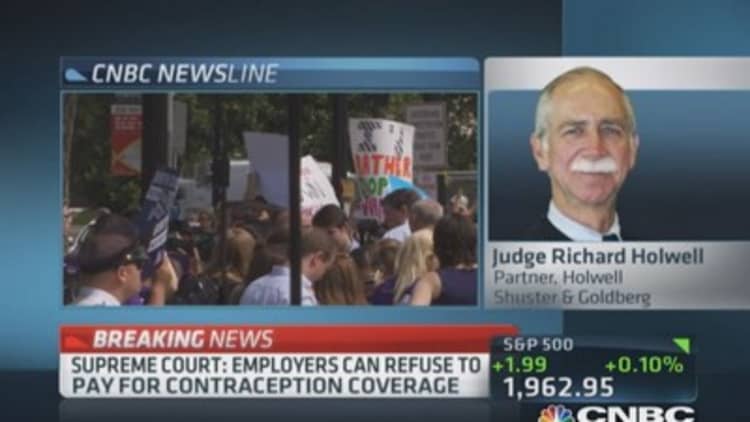In a decision that drew an unusually fierce dissent from the three female justices, the Supreme Court sided Thursday with religiously affiliated nonprofit groups in a clash between religious freedom and women's rights.
The decision temporarily exempts a Christian college from part of the regulations that provide contraception coverage under the Affordable Care Act.
The court's order was brief, provisional and unsigned, but it drew a furious reaction from the three female members, Justices Sonia Sotomayor, Ruth Bader Ginsburg and Elena Kagan. The order, Justice Sotomayor wrote, was at odds with the 5-to-4 decision on Monday in Burwell v. Hobby Lobby Stores, which involved for-profit corporations.
Read MoreWhite House: Will work to make sure women affected by rulingwill have access to contraception
"Those who are bound by our decisions usually believe they can take us at our word," Justice Sotomayor wrote. "Not so today."
The court's action, she added, even "undermines confidence in this institution."
Monday's decision and the order on Thursday were dual blows to the Obama administration's efforts to provide contraception coverage, said Walter Dellinger, who was acting United States solicitor general in the Clinton administration.
"Before the Hobby Lobby ruling women had guaranteed contraceptive coverage as part of their employment health insurance," he said. "After today, it is clear that their access to contraception is by no means guaranteed given the administrative complexities the court has now imposed upon" the Department of Health and Human Services.
Read More
Justice Sotomayor said the majority, which acted on an emergency application, had not only introduced pointless complexity into an already byzantine set of regulations but had also revised its Hobby Lobby decision.
That decision, Justice Sotomayor said, endorsed an arrangement allowing nonprofit groups to sign a form that would transfer the delivery of free contraception under the Affordable Care Act to others. But Thursday's order rejected the mandatory use of the forms for Wheaton College in Illinois.
Justice Sotomayor said the ruling reached beyond Wheaton and could lead to similar results at many other nonprofit religious organizations that have similar concerns. "The issuance of an injunction in this case will presumably entitle hundreds or thousands of other objectors to the same remedy," she said.
Read MoreTop Court ruling: 'Labor unions are not wanted'
Mark L. Rienzi, a lawyer at the Becket Fund for Religious Liberty, which represents Wheaton, said, "The court rightly recognized that Wheaton's religious community should be allowed to practice its faith free from crushing government fines."
The college objected to coverage of intrauterine devices and so-called morning-after pills, saying they were akin to abortion. Many scientists disagree.
The court did not announce how most of the justices had voted, which is typical when it issues unsigned opinions. In the Hobby Lobby case on Monday, Justice Stephen G. Breyer joined Justices Sotomayor, Ginsburg and Kagan in dissent.
Read MoreWhite House: Ruling jeopardizes women's health
The majority opinion there, written by Justice Samuel A. Alito Jr., seemed to suggest that the forms could play a role in an arrangement that was an acceptable alternative to having employers pay for the coverage. Under the arrangement, insurance companies that receive the forms pay for the coverage on the theory that it costs no more to provide contraception than to pay for pregnancies.

On Thursday, the court's majority said all Wheaton had to do was notify the government in writing "that it is a nonprofit organization that holds itself out as religious and has religious objections to providing coverage for contraception services."
The difference between a form sent to insurers and plan administrators on the one hand and a letter sent to the government on the other mattered, the college told the justices, "because it believes, as a religious matter, that signing the form would be impermissibly facilitating abortions and is therefore forbidden."
Read MoreSupreme Court denies four cases
"To be sure, free citizens in a diverse nation will have different views about whether signing the form makes someone complicit," the college's brief said. "But that is a question of 'religious and moral philosophy' for Wheaton," not the government. The quoted phrase came from the Hobby Lobby decision.
Justice Sotomayor said the college's analysis was misguided on several levels. "The sincerity of Wheaton's deeply held religious beliefs is beyond refute," she wrote. "But as a legal matter, Wheaton's application comes nowhere near the high bar necessary to warrant an emergency injunction from this court."
The form requires only a statement that the employer has a religious objection to some or all forms of contraception, that it is nonprofit and that it "holds itself out as a religious organization."
Read MoreAereo CEO: We're disappointed in the outcome, but our work is not done
"Rather than availing itself of this simple accommodation," Justice Sotomayor wrote, "Wheaton filed suit."
The court majority said its order would still allow the college's employees and students "to obtain, without cost, the full range" of contraceptives approved by the Food and Drug Administration. On receiving notification from the college, the government, the majority said, would then be free "to facilitate the provision of full contraceptive coverage."
The order noted that it was temporary and was not the final word on whether the forms were required.
Justice Antonin Scalia would apparently have gone further. He added a cryptic note on Thursday that he "concurs in the result."
More from The New York Times:
Teenagers' Deaths Raise Fears of Blood Feud
Social Media's Vampires: They Text by Night
Clicking Their Way to Outrage
The court issued a similar order in January in a case involving Little Sisters of the Poor, an order of Roman Catholic nuns. There were no noted dissents.
Lower courts have denied requests for injunctions on Wheaton's objection while the case moves through the courts. The most recent ruling, from the federal appeals court in Chicago on Monday, said no injunction was warranted given the Supreme Court's ruling in Hobby Lobby.

The Wheaton suit invoked the Religious Freedom Restoration Act of 1993, the same law that was at issue in Hobby Lobby. The law applies when the government subjects religious practices to a "substantial burden." The college said it should not be second-guessed by the government.
Justice Sotomayor disagreed. "Let me be absolutely clear," she wrote. "I do not doubt that Wheaton genuinely believes that signing the self-certification form is contrary to its religious beliefs. But thinking one's religious beliefs are substantially burdened — no matter how sincere or genuine that belief may be — does not make it so."
Read MoreA simple solution to Hobby Lobby outrage
Even were the college able to show a substantial burden, Justice Sotomayor continued, its objection would still fail further scrutiny. The majority in Hobby Lobby, she said, had held out the accommodation as a less restrictive alternative to requiring employers to pay for contraception coverage. "Today's grant of injunctive relief simply does not square with the court's reasoning in Hobby Lobby," she wrote.
Notifying the government rather than an insurance company makes no sense, she said. "The court's actions in this case create unnecessary costs and layers of bureaucracy," Justice Sotomayor wrote, "and they ignore a simple truth: The government must be allowed to handle the basic tasks of public administration in a manner that comports with common sense."

